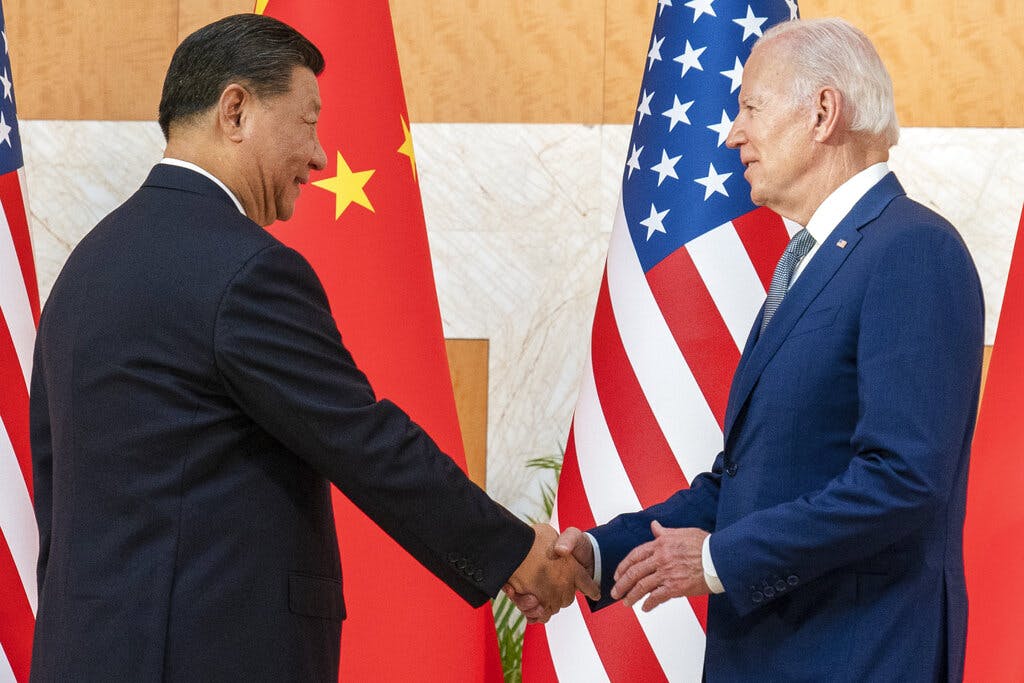None Dare Call It Appeasement: A New Soft Line on China Emerges on the Left
Anticommunism, though, rather than racism, animates today’s China hawks.

Just as the Wall Street Journal broke the news of a Chinese Communist spying campaign aimed at American military bases, the New York Times was launching a new push for a softer line against the Chinese Communist Party.
Unlike an earlier Times opinion piece that came directly from a Chinese Communist defense official, these two latest articles run beneath bylines that will be familiar to regular Times readers — Peter Beinart and Bret Stephens.
The Beinart-Stephens arguments are worth considering as an indication of where the domestic debate is heading about how to handle the country that is America’s most formidable strategic competitor for global influence.
If America is to marshal the resources and consensus needed to prevail over the Chinese Communist challenge, it’ll have to dispatch these soft-line talking points. Versions of them show up every time America faces implacable enemies, whether the Axis Powers of World War II or the Soviet Communists of the Cold War or the “Islamic fascists” of World War IV.
The weaker of the two pieces is from Mr. Beinart, an $180,000-a-year employee of the New York taxpayers as a professor at the City University of New York. Under the headline “The Real Reason Republicans Are So Obsessed With China,” Mr. Beinart claims “the problem” is that Republicans “see it as a threat to white Christian power.”
The Beinart article is evidence of how low the bar is for hurling accusations of racism. What are some of the things conservatives are angry at Communist China about? Communist China is threatening Taiwan, an island populated by not a lot of white people.
Communist China is arresting and imprisoning Hong Kong advocates of democracy and the rule of law such as Jimmy Lai and Cardinal Zen. And Communist China is conducting what the American government describes as an “ongoing genocide” against the Uyghur Muslim minority in Xinjiang. If there’s any racism involved in that genocide, it’s the Chinese Communist desire to wipe out the Uyghurs, not the American pushback against the genocide.
As far as defending Christianity against Communism, it’s not clear why anyone other than Mr. Beinart and his readers would consider that a “problem.” Defending the free exercise of religion against godless communism has been a bipartisan American foreign policy goal since at least President Kennedy’s inaugural address.
“The same revolutionary beliefs for which our forebears fought,” JFK declared, “are still at issue around the globe — the belief that the rights of man come not from the generosity of the state but from the hand of God.”
It’s embodied in the International Religious Freedom Act of 1998, which passed the Senate 98 to 0 and was signed into law by President Clinton. It’s a single consistent principle that supports the religious freedom of Cardinal Zen and the Uyghur Muslims and, for that matter, the Jews like Natan Sharansky who were trying to learn Hebrew under the Soviet Communists.
Depicting China as an obsession of Republican racism ignores Speaker Pelosi’s trip to Taiwan and ignores the AFL-CIO’s concern about American factory jobs being sucked away to a country where independently organized labor unions are outlawed. As an explanatory framework, it doesn’t logically fit the facts.
Mr. Stephens, for his part, calls for removing Trump-era tariffs on China that President Biden has left in place. “Pursue a policy of détente,” he advises, using a French word to propose a policy fit for cheese-eating surrender monkeys.
“We should not seek a new cold war with China,” Mr. Stephens writes, committing the solipsistic fallacy also evident in a recent Bloomberg editorial that pleaded, pathetically, “The US, in particular, should try harder to reduce tensions with Beijing.”
Yet it’s not all up to us. Communist China is sending spies, Fentanyl, and Covid-19 to the U.S., while threatening Taiwan, trampling Hong Kong and Xinjiang, arming Russia and Iran, and expanding a military presence in Cuba — not to mention the Donbas.
To the extent that Mr. Stephens explains his thinking, it appears to be partly motivated by concern that a worsening Chinese economy would hurt American exporters. “A China that can buy less from the world — whether in the form of handbags from Italy, copper from Zambia or grain from the United States — will inevitably constrain global growth,” he writes.
Yet the best way to revive the Chinese economy and spur growth would be to free it from the Communist Party domination that is smothering it with central planning, rather than to prop up and extend the Communist rule with American subsidies.
The big global economic story of the past decade, after all, has been how America has decoupled from Communist China with hardly any adverse effect on the American economy. United States imports from China have declined to 13.3 percent of overall imports in 2023 from a peak of 21.6 percent in 2017, according to the Wall Street Journal.
“Don’t think of China’s misfortunes as our good fortune,” Mr. Stephens advises, making the error of conflating the Chinese Communist Party with China itself or its people, who have never given the regime the consent of the governed.
The advocates of détente with the Chinese Communist Party are making the same mistake that the advocates of détente with the Soviet Union did in the 1970s when they opposed the Jackson-Vanik legislation or that is made by proponents of lifting sanctions on Iran.
If the foreign policy sages are looking for an accent aigu to throw around, they’d be better off turning to Robert Strausz-Hupé. In his 1961 book, “A Forward Strategy for America,” Strausz-Hupé, who became Reagan’s ambassador to Ankara, recommended, “We should proclaim by word and confirm with deed that freedom within Soviet Russia and China and the independence of the captive nations are American political objectives.”

